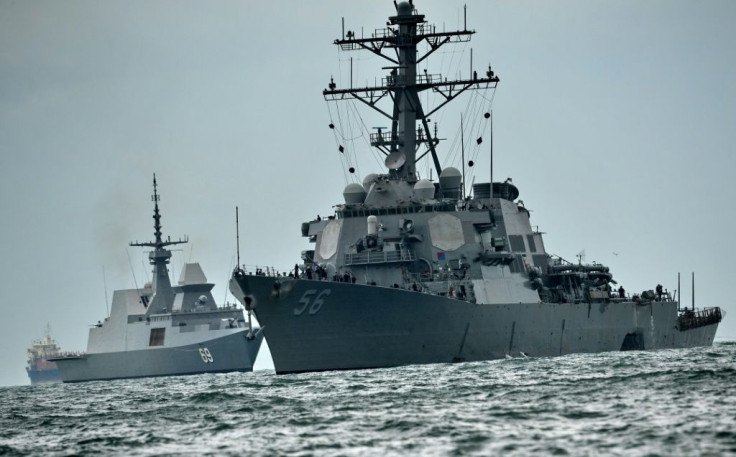China Wrecks US View On Taiwan Strait With Exclusive Claim: 'No Such Thing As International Waters'
KEY POINTS
- China said the strait fell within its territorial waters and exclusive economic zone
- The U.S. regularly conducts freedom of navigation exercises through the Strait
- Taipei has called Beijing's sovereignty claim over the Taiwan Strait a "false claim"
Days after it vowed to "fight to the very end" to stop Taiwanese independence, Beijing asserted its sovereignty and jurisdiction over the Taiwan Straits, denying the U.S.claims that the channel was international waters.
Foreign ministry spokesman Wang Wenbin told a press conference in Beijing on Monday that the Strait fell within China’s territorial waters and exclusive economic zone as defined by the United Nations Convention on the Law of the Sea (UNCLOS) and domestic law.
"China enjoys sovereign rights and jurisdiction over the Taiwan Strait, while respecting the legitimate rights of other countries in the relevant maritime areas," Wang was quoted by South China Morning Post.
Wang noted that the waters of the Taiwan Strait extend from the shores of both sides to the central line of the Strait, which in turn includes China's internal waters, territorial sea, contiguous zone, and exclusive economic zone, according to the UN convention and China's domestic law, as the Taiwan Strait is about 70 nautical miles at its narrowest and 220 nautical miles at its widest.
"There is no such thing as ‘international waters’ in UNCLOS. By claiming that the Taiwan Strait is international waters, some countries intend to create an excuse for its manipulation of the Taiwan issue and threaten China’s sovereignty and security," Wang added.
The strait that separates the Chinese mainland and Taiwan has been seeing a brisk military presence over the last year as China insists on reunifying Taiwan with the mainland.
China's claims come as a challenge to the U.S. which regularly conducts freedom of navigation exercises through the Strait, by considering it international waters. USS Port Royal transited through the Taiwan Strait on May 10, a month after USS Sampson sailed through the disputed waters, evoking a strong response from China both times.
Weng also reiterated Beijing’s position that Taiwan is an inseparable part of China and its territorial seas and EEZ cover the entire strait.
However, China's claim was met with protest from Taiwan which called Beijing's sovereignty claim over the Taiwan Strait a "false claim."
According to Ministry of Foreign Affairs (MOFA) spokeswoman Joanne Ou, the only waters over which any country has full sovereignty are its 12-nautical mile territorial waters. She added that the Taiwan Strait consists of international waters, except for areas that can be defined as territorial water.
Ou accused Beijing of "distorting international law" in ignoring Taipei's sovereignty claim over the Taiwan Strait, and said that by downgrading the strait to its exclusive economic zone (EEZ), China "revealed its ambition to annex Taiwan."
Meanwhile, China's open wrangling over the legal status of the Taiwan Strait has triggered speculation that Beijing might consider steps to stop foreign vessels from transiting through the strait.

© Copyright IBTimes 2025. All rights reserved.





















